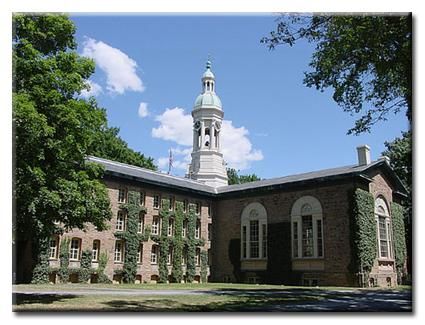By Philip Sean Curran, Staff Writer
The national debate about free speech at college campuses surfaced at Princeton University, with the school’s Center for Jewish Life canceling an appearance this week by a pro-Zionist member of the Israeli government amid student backlash.
As it turned out, another Jewish organization agreed to be the host of Tzipi Hotovely, a Likud, or conservative party, member of the Israeli parliament and the deputy minister of foreign affairs. Hotovely, touring U.S. colleges, spoke on campus, in the Lewis Library, Monday, with student protesters standing outside the venue.
“We believe in free speech,” said Rabbi Eitan Webb, director of the Chabad of Princeton University, the organization that stepped forward to be the host. “This is a person whose voice should be heard.”
The controversy about Hotovely’s Princeton visit drew public attention in a Nov. 5 letter to the editor in the student newspaper, The Daily Princetonian. In it, the Alliance of Jewish Progressives and Allies and others charged that Hotovely has made “racist statements” and faulted the university’s Center for Jewish Life-Princeton Hillel “to host a racist speaker like Hotovely while it continues to quiet progressive voices.”
“She has stated her opposition to a Palestinian state and has made it her mission to expand settlement construction in the West Bank,” the letter read in part. “Hotovely’s alarming vision for the future is coupled with a complete rejection of Palestinian history and connection to key sites such as the Haram al-Sharif.”
The Haram al-Sharif is also known as the Temple Mount, a sacred place for Jews and Muslims.
In an interview with The Jerusalem Post published last week, Hotovely said, “The university campuses are one of the most difficult and important arenas, and I come as a representatives of the government and a representative of the ruling party on a journey that will begin the hard work of changing the trend toward Israel on US campuses.”
The leader of the campus Jewish organization that was the original host of Hotovely released a statement explaining its decision.
“The Center for Jewish Life at Princeton decided to postpone the program with Member of Knesset Tzipi Hotovely until we can properly vet the program through our Israel Advisory Committee,” said Rabbi Julie Roth, executive director of the Center for Jewish Life-Princeton Hillel. “We are fortunate that our colleagues at Chabad agreed to host the program today as originally scheduled and we are encouraging our students who are interested to attend. We regret the last-minute change and apologize to Ms. Hotovely for the inconvenience. We look forward to a continued robust and healthy debate around Israel in our community.”
But in Wednesday’s Jerusalem Post, Roth writing along with Eric D. Fingerhut, president and CEP of Hillel International, apologized for the “mistake.”
“Unfortunately, we did not treat the Israeli deputy foreign minister with the respect that her office deserves, and postponed the event,” they wrote.
Messages at the Israeli consulate in New York were not returned this week.
The controversy about Hotovely’s visit comes amid concerns nationally about the tolerance, or lack thereof, on college campuses for speakers that students disagree with. A notable example involved social scientist Charles Murray and a faculty member being attacked at Middlebury College, in Vermont, earlier this year.
“Many people worry about the state of campus speech today, and understandably so,” Princeton President Christopher L. Eisgruber wrote in the June 7 edition of the Princeton Alumni Magazine.
Israel is a hot topic on college campuses, where Princeton has not joined the movement to divest in companies that do business there. Eisgruber, who is Jewish, visited Israel in 2014 to meet with Princeton alumni and said afterward that the country has “special meaning for me and my family… .”

